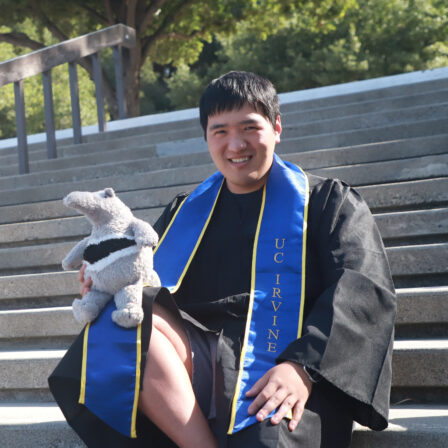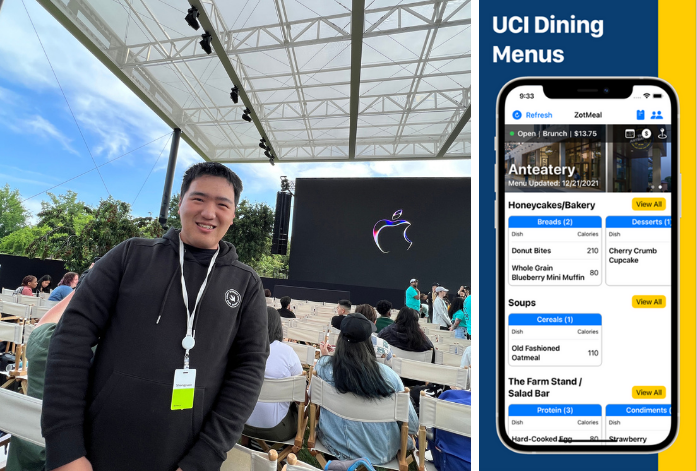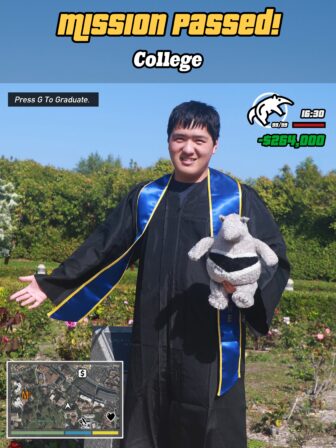Senior Spotlight: Shengyuan Lu Overcomes Visa Limits to Reach New Heights

Shengyuan Lu, a software developer by profession and a creative artist at heart, finds fulfillment in bringing ideas to life. As a first-year student from China in UC Irvine’s Donald Bren School of Information and Computer Sciences (ICS), he developed ZotMeal and TOEFL Speaking Helper, supporting more than 15,000 users between the two apps. Lu has since earned multiple programming awards, twice winning the coveted Apple Worldwide Developers Conference scholarship. He has also received the Chancellor’s Award of Distinction, Billy Steckler Endowed Scholarship, and Distinguished Anteater Award. Despite facing immigration challenges, he has thrived as an international student and will graduate in June with bachelor’s degrees in both computer science and business information management. He will then start his career as a production engineer at Meta. “I was determined never to allow my student visa to limit what I could become.”
How was it starting out as an international student during the pandemic?
The pandemic hit me right at the beginning of my college journey. As an international student, I pay three times the tuition compared to a California resident. To make matters worse, the strict Covid regulations in my home country pushed my family’s business to near bankruptcy. The financial security I had enjoyed for the past 18 years vanished overnight, prompting me to find a way to support myself as quickly as possible.
But I severely underestimated how hard it would be to find a job as an international student. I applied everywhere on campus: from housing to libraries, but none of these places wanted a freshman with a blank resume. Even a burger flipper position at the University Town Center’s In-N-Out was out of reach, because my student visa wouldn’t allow me to work there. I was stuck but not defeated.
So how did you persevere?
I knew I had to start somewhere. On Instagram, I saw an ad for a hackathon, which is a programming competition to build an app in 36 hours. It seemed impossible, but I gathered just enough courage to test out an idea with a couple of friends. We scrambled to build a prototype that showed UCI dining hall menus and published a video about it on the r/UCI subreddit. The post received more than 200 upvotes in less than a day. Realizing the demand, I sacrificed my winter break to build the production version of ZotMeal, which now has more than 6,000 users.
ZotMeal marked a pivotal turning point in my college journey. I realized that despite my student visa restrictions, my potential far exceeded what I had ever imagined. Creating something that impacted thousands of students also gave me the confidence I needed to thrive in a foreign land, 7,000 miles from home. It opened doors such as enabling me to win Apple’s programming competition and attend its Worldwide Developer Conference.

During my sophomore year, I secured a position as a student assistant — my first ever job in America! I was making minimum wage, but I was over the moon. I felt proud to be able to support myself for the first time, but the excitement was short-lived.
What barriers did you face in trying to secure an internship?
Have you seen the question “Will you now or in the future require visa sponsorship?” To many of you, it’s just a checkbox, but to me, it’s a death sentence. Few companies are willing to hire international students. This reality, combined with a shrinking tech job market, made securing an internship like climbing Mt. Everest. In eight months, I submitted over 800 internship applications but got zero offers.

I started to doubt myself. Was I just not good enough? After yet another day of receiving a mailbox full of rejection letters, I knew I had to find an alternative. Internships are the safest path to full-time job offers, but this familiar route wasn’t working for me.
After doing some research, I discovered many fully funded engineering fellowships that don’t require a work visa. I immediately started networking and applying. Eventually, I was accepted into a production engineering program sponsored by Meta. I was hesitant at first, because I would be attending summer session as a full-time student while working a part-time job, but I couldn’t afford to pass up this opportunity. Luckily, the scholarships I received from UC Irvine enabled me to reduce my work hours, making it possible to participate in the fellowship.
How did the Meta fellowship end up in a job offer?
That’s the crazy part. Because of my great performance during the fellowship, a Meta recruiter reached out to me for a new grad position. Seven rounds of interviews later, I landed the job, and the fear of deportation after graduation finally lifted! While the path to earning permanent residency remains challenging, I’m thrilled by how far I’ve come.

I sent out over 1,200 “new grad” job applications during the 2023-24 cycle. The large number still shocks me and reminds me of the incredible support from individuals who believed in my journey. To my parents, partner, professors, managers, scholarship donors, and friends — thank you! I am a firm believer that my immigration status could never limit how much I could achieve, and you backed that belief all the way. This affirmation was incredibly empowering, refreshing my sense of purpose and dedication.
At UC Irvine, I grew from not being able to get a job, to working on artificial intelligence at Meta! I am excited to see what the future holds for me and to discover who I will become in the next ten years.
— Shani Murray